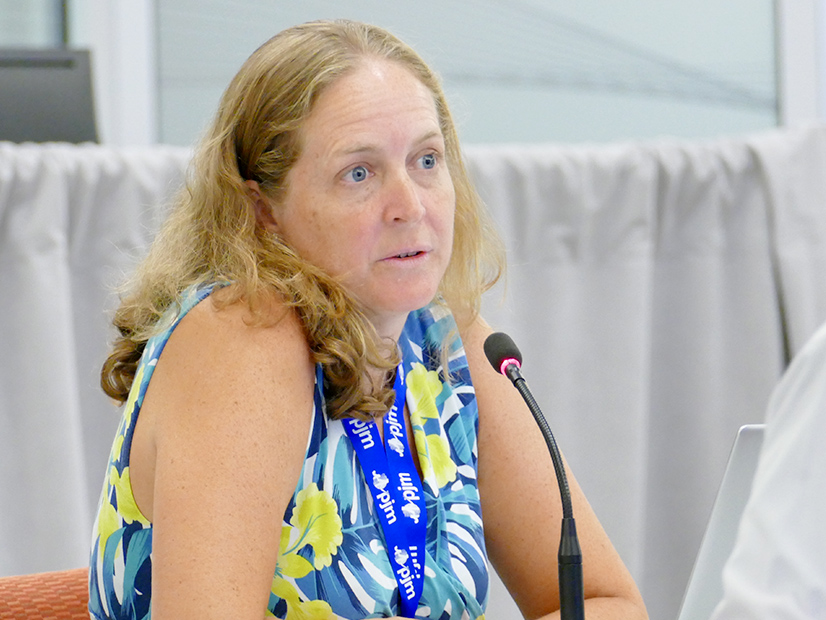A bill passed by the Maryland House of Delegates last week would require that utilities submit annual reports detailing their votes at PJM, including an explanation of how each vote benefits the public interest.
Del. Lorig Charkoudian, the sponsor of HB1186, said the bill would provide needed insight for legislators into the decision-making at PJM and aid them in determining if utilities operating in the state are acting contrary to clean energy policy goals and ratepayers’ interests. The General Assembly holds the authority to determine the state’s generation mix targets and is expected to protect consumers, she said, but its legislation is often undermined by decisions made by PJM stakeholders.
The House passed the bill 100-35 on Saturday, advancing it to the Senate Education, Energy and the Environment Committee.
“We’re in this position where sometimes I call PJM a shadow government because you have an LLC that is theoretically … neutral on policy, but in reality the decisions they make every day … absolutely make or break our climate change rules,” Charkoudian told RTO Insider.
Most of the state’s utilities are voting members of PJM:
- the four investor-owned utilities: Exelon’s (NASDAQ:EXC) Delmarva Power and Light, Potomac Electric Power Co. (Pepco) and Baltimore Gas and Electric; and FirstEnergy’s (NYSE:FE) Potomac Edison;
- the municipal utilities for Berlin, Easton, Hagerstown, Thurmont and Williamsport; and
- the Southern Maryland Electric Cooperative (SMECO).
Two rural electric co-ops — A&N Electric and Choptank Electric — are members of Virginia-based Old Dominion Electric Cooperative, itself a PJM member but presumably would not be subject to the bill. According to the fiscal and policy note for the bill released by the Department of Legislative Services, “the companies can likely submit the required voting record information with existing resources. If not, local expenditures increase minimally. Revenues are not affected.”
Charkoudian said that lawmakers’ attempts to understand how local utilities are voting on matters affecting the state are stymied by PJM rules, which do not make public the votes individual entities make at the lower committees and task forces. Though votes at the Members Committee are public, Charkoudian said initiatives benefiting the state may be blocked before they reach that level without legislators being able to understand why.
In particular, she pointed to the parameters defining the variable resource requirement curve as influencing the type of generation that is likely to be built in the state, while backlogs in the interconnection queue have limited the ability for renewable generation to be developed.
“I don’t think this bill solves the problem, but it leads to a better … conversation about what we can do to ensure that PJM is reinforcing what we’re trying to do,” Charkoudian said.
PJM spokesperson Jeff Shields said that all committees where votes are taken are open to the public and media.
“PJM has not been asked to opine on this legislation,” Shields said. “All committees where votes are taken are open to the public and to the media. Votes of PJM’s most senior committee, the Members Committee, are public, and a voting report is posted showing individual votes.”
Stakeholder Comments
The Maryland Energy Administration, Office of People’s Counsel and the state’s chapter of the Sierra Club submitted favorable testimony to the House Economic Matters Committee. They argued that the bill would provide transparency without interfering with utilities’ ability to cast votes on issues before PJM.
“Public service companies are provided with state-granted monopolies in order to perform important public functions and are required to operate ‘in the interest of the public,’” the OPC said. “At the same time, however, many public service companies are private companies with fiduciary obligations to earn profits for their investors. Unless effectively regulated, public service company votes at PJM can result in serious misalignments with the public interest.”
The IOUs and SMECO all submitted testimony in opposition to the bill, which they say would stifle debate and create significant administrative burden without providing much benefit to legislators.
Exelon Vice President of Federal Regulatory Affairs Sharon Midgley, a regular attendee of PJM committee meetings, said the company supports transparency and is willing to engage with policymakers and regulators, but it believes the legislation in its current form misses the mark. She said the requirement that the public benefit rationale for each vote be described is vague, with there being many competing issues of public interest, including affordability, security and the environment.
For votes in the lower committees, Midgley said there is currently no framework for logging individual votes — particularly those taken by voice or acclamation, which allow an item to pass if there are no objections. Requiring those votes to be cast would add a responsibility to stakeholders based in other states and sectors.
Midgley also pointed to PJM’s Manual 34, which states that all matters before stakeholders are considered preliminary until a vote is taken by the MC.
“All participants understand that documents, reports, slideshows and other written material used at all until final Member Committee and/or PJM board approval are intended to be works in progress and to encourage dialogue, discussion, debate and, preferably, movement towards consensus,” the manual says. “Therefore, such work products should be treated in the spirit to which they are intended; that is, not as final or complete documents, nor the final position or view of a participant.”
In its comments, FirstEnergy noted that the votes at the Markets and Reliability Committee and MC consolidate all affiliates together so each corporate entity has a single vote, which it said often means that its vote on an issue may not be driven by issues in any one state.
“Because of this consolidated vote, there are times when FirstEnergy’s ‘vote’ is not driven by Potomac Edison or Maryland considerations. Compelling utilities to report and explain their vote in these situations just does not make sense,” said the company, which has subsidiaries in Ohio, Pennsylvania, West Virginia and New Jersey.




